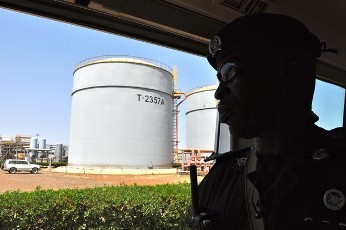Sudan’s ex-minister calls for oil crisis convention, speaks of alternative pipeline to Djibouti
By Ngor Arol Garang
February 4, 2012 (JUBA) – The former minister of petroleum in the then government of national unity in Khartoum on Saturday called for a convention over oil crisis among members of South Sudan’s ruling party.

South Sudan officially seceded from Sudan in July 2011 after a referendum held earlier the same year showed an overwhelming majority in favor of independence from the North.
Since becoming an independent state landlocked South Sudan has suffered from rising inflation and has been unable to to settle a number of critical issues with its northern neighbor.
These include border demarcation, citizenship, national debt, the disputed territory of Abyei and transit fees for exporting South Sudan’s crude oil using the north’s pipeline and refineries.
Talks over pending issues between the countries mediated by the African Union High Implementation Panel (AUHIP) under chairmanship of former South African President Thabo Mbeki, have so far failed to bring an agreement between the two sides.
Officials from the South Sudan’s ruling Sudan People’s Liberation Movement have always accused Khartoum of lacking spirit of negotiation to reach a fair deal. But Khartoum blames South Sudan for a lack of seriousness to reach a settlement on the outstanding issues.
Khartoum demands South Sudan pays $32.02 per barrel of oil that passes through its territory. Juba says it will only pay around $1 a barrel.
In December, the South Sudanese government said Khartoum was preventing its oil cargo ships from leaving Port Sudan. Furthermore Juba claimed that some of the ships belonging to potential buyers tried to enter the port but were denied entry.
Stephen Dhieu Dau, the country’s oil minister said that the Sudanese government was not only blocking exports of the oil but that it has also decided to confiscate a portion of the oil as payment for unpaid transit fees of $1 billion.
Juba denies it is not paying fees and responded by shutting down oil production in January.
Speaking in an exclusive interview with Sudan Tribune on Saturday, Sudan’s former oil minister said the decision of the government to shut down oil production operation was one of the challenges which the SPLM leadership in collaboration with other partners needs to address.
“The primary victim of this decision now is the ministry of finance because South Sudan’s economic depends largely on oil. It accounts for 98% of its national income. Where will it get money to pay for all the needs, since the source of income has been cut”, Deng asked.
The senior official said he had anticipated the ongoing oil crisis while still a minister in the national government in Khartoum when the South was still part of the north.
He said that one of the scenarios from the discussions they had at the ministry was about constructing alternative pipelines to some of the neighbouring countries in case the exporting to the Red Sea is blocked.
He said that studies found that exporting the oil through Djibouti would be a shorter distance than using the established pipeline going all the way from South Sudan to the Red Sea.
He said he had presented these recommendations to the South Sudan’s president, Salva Kiir, prior to the independence of South Sudan.
Deng explained that the type of oil found in South Sudan is thick that it can “clot” after two weeks if production is stopped.
“Oil is not like water; especially type of oil we have in South Sudan. It is the thick type of oil which you can lose easily after three weeks until maybe when you begin another exploration”, he explained adding further that “one can close water in the tap and may find it a still a fresh once the tape is opened but not in the case of oil.”
However, he said his message to the public was to support the decision of the government and help the leadership with ideas of how cope without oil revenue, until a deal is reached or a new pipeline is built.
Deng said that the new country needs to “manage our resources properly” and diversify the economy including utilising the fertile land in South Sudan.
(ST)
